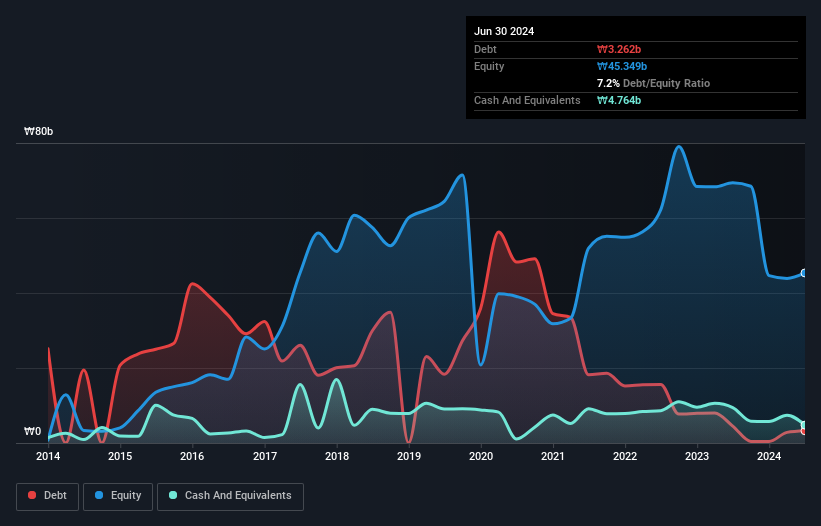Legendary fund manager Li Lu (who Charlie Munger backed) once said, 'The biggest investment risk is not the volatility of prices, but whether you will suffer a permanent loss of capital.' It's only natural to consider a company's balance sheet when you examine how risky it is, since debt is often involved when a business collapses. We note that Ameridge Corporation (KOSDAQ:900100) does have debt on its balance sheet. But the real question is whether this debt is making the company risky.
Why Does Debt Bring Risk?
Generally speaking, debt only becomes a real problem when a company can't easily pay it off, either by raising capital or with its own cash flow. Ultimately, if the company can't fulfill its legal obligations to repay debt, shareholders could walk away with nothing. However, a more usual (but still expensive) situation is where a company must dilute shareholders at a cheap share price simply to get debt under control. By replacing dilution, though, debt can be an extremely good tool for businesses that need capital to invest in growth at high rates of return. When we think about a company's use of debt, we first look at cash and debt together.
Check out our latest analysis for Ameridge
How Much Debt Does Ameridge Carry?
The image below, which you can click on for greater detail, shows that Ameridge had debt of ₩3.26b at the end of June 2024, a reduction from ₩4.51b over a year. However, its balance sheet shows it holds ₩4.76b in cash, so it actually has ₩1.50b net cash.

A Look At Ameridge's Liabilities
According to the last reported balance sheet, Ameridge had liabilities of ₩2.63b due within 12 months, and liabilities of ₩3.39b due beyond 12 months. On the other hand, it had cash of ₩4.76b and ₩2.25b worth of receivables due within a year. So it actually has ₩996.7m more liquid assets than total liabilities.
This state of affairs indicates that Ameridge's balance sheet looks quite solid, as its total liabilities are just about equal to its liquid assets. So it's very unlikely that the ₩53.7b company is short on cash, but still worth keeping an eye on the balance sheet. Simply put, the fact that Ameridge has more cash than debt is arguably a good indication that it can manage its debt safely. There's no doubt that we learn most about debt from the balance sheet. But you can't view debt in total isolation; since Ameridge will need earnings to service that debt. So if you're keen to discover more about its earnings, it might be worth checking out this graph of its long term earnings trend.
In the last year Ameridge had a loss before interest and tax, and actually shrunk its revenue by 41%, to ₩31b. That makes us nervous, to say the least.
So How Risky Is Ameridge?
Statistically speaking companies that lose money are riskier than those that make money. And the fact is that over the last twelve months Ameridge lost money at the earnings before interest and tax (EBIT) line. And over the same period it saw negative free cash outflow of ₩6.4b and booked a ₩37b accounting loss. Given it only has net cash of ₩1.50b, the company may need to raise more capital if it doesn't reach break-even soon. Even though its balance sheet seems sufficiently liquid, debt always makes us a little nervous if a company doesn't produce free cash flow regularly. There's no doubt that we learn most about debt from the balance sheet. However, not all investment risk resides within the balance sheet - far from it. For instance, we've identified 4 warning signs for Ameridge (2 don't sit too well with us) you should be aware of.
If, after all that, you're more interested in a fast growing company with a rock-solid balance sheet, then check out our list of net cash growth stocks without delay.
New: Manage All Your Stock Portfolios in One Place
We've created the ultimate portfolio companion for stock investors, and it's free.
• Connect an unlimited number of Portfolios and see your total in one currency
• Be alerted to new Warning Signs or Risks via email or mobile
• Track the Fair Value of your stocks
Have feedback on this article? Concerned about the content? Get in touch with us directly. Alternatively, email editorial-team (at) simplywallst.com.
This article by Simply Wall St is general in nature. We provide commentary based on historical data and analyst forecasts only using an unbiased methodology and our articles are not intended to be financial advice. It does not constitute a recommendation to buy or sell any stock, and does not take account of your objectives, or your financial situation. We aim to bring you long-term focused analysis driven by fundamental data. Note that our analysis may not factor in the latest price-sensitive company announcements or qualitative material. Simply Wall St has no position in any stocks mentioned.
About KOSDAQ:A900100
Excellent balance sheet with low risk.
Market Insights
Community Narratives



